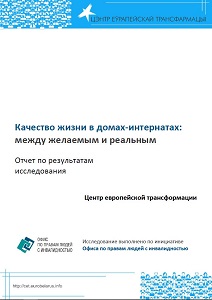Качество жизни в домах-интернатах: между желаемым и реальным
Quality of life in Boarding Houses: Between the desired and the real
Author(s): Andrey Egorov, Oksana Shelest, Violetta Yermakova, Tatyana Anushkevich
Subject(s): Health and medicine and law, Welfare services
Published by: Центр европейской трансформации
Summary/Abstract: In Belarus, there is a network of stationary social service institutions (boarding houses) inherited from Soviet times, where more than 18 thousand people live. It includes (as of January 1, 2013) 78 community-owned and 1 state-owned inpatient social service institutions for the elderly and disabled (45 are psychoneurological, 24 are for the elderly and disabled, and 10 are for disabled children with psychophysical development). Legislative framework, law enforcement practice, accepted standards of living, established traditions of entry, residence and exit from these institutions often significantly limit the fullness and possibilities of realization of human rights for people living in boarding schools. It is not so much about separate violations of rights that arise in the event of illegal actions by individual representatives of the administration, medical and service personnel of these institutions in relation to residents, or residents in relation to each other. Rather, the entire complex of social relations and the living environment itself is organized in such a way that it leads to systematic discrimination and restrictions on the rights of residents of boarding houses. The closure of these institutions and low public attention to this problem only aggravates the situation, and the problem of discrimination and living conditions in boarding schools is not only not solved, but is not even put on the agenda of reforming the social service system.
Series: ЦЕНТР ЕВРОПЕЙСКОЙ ТРАНСФОРМАЦИИ - Отчет по результатам исследования
- Page Count: 73
- Publication Year: 2014
- Language: Belarusian
- Content File-PDF

